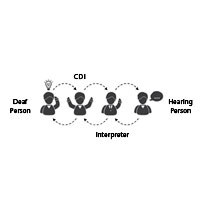All Articles
Iconic Signs Featured as the Sign of the Day
Next week, from March 22 through March 29, our Sign of the Days will feature iconic signs. Iconic signs convey the meaning of what is being signed. Look for the signs for HELLO, DRINK, EAT, AIRPLANE, CAR, BICYCLE, TYPE, and BALL.
You can see more iconic signs by visiting the Iconic Signs wordlist from the soon to be released book Activities in American Sign Language published by the Registry of Interpreters for the Deaf (RID) Press. The book by Brenda Cartwright and Sue Bahleda groups signs ...
Interpreter 4-1-1: Tax Tips for Interpreters
Interpreters often do a lot of freelance / independent contractor work, and receive a Form 1099 at the end of the year to report their compensation. When you are self-employed and do independent contractor work, there are several tax deductions that you can take advantage of. Hopefully you have already been preparing yourself and organizing your taxes. Just in case you need it, here are some helpful hints...
2015 Read Across America Day
Read Across America Day is every year on March 2nd - Dr. Seuss’s birthday. The whole month of March is also National Reading Month. The events are used to encourage reading and literacy. Reading any book is great, but the National Education Association chooses a book every year and this year’s book is the Dr. Seuss book Oh, The Places You’ll Go.
Resources for this year’s Read Across America Day
Get the book:
Printable activities to accompany the book:
Find ...
Tips for Reading with Deaf and Hard of Hearing Children
The Importance of Reading with Children
According to the U.S. Department of Education, only 53 percent of children ages three to five are read to daily by a family member.1 Yet, children are significantly better at reading comprehension when parents read with them and encourage reading.2 Children who are read to at home do better in school. Research shows they are better at knowing the alphabet, counting, writing their names, and reading.3 Additionally, the more types of reading materials there are in the home, the ...
Voice Contestant Signs the Team She Wants to Be on
When it was time for The Voice contestant Treeva Gibson to choose which coach’s team she wanted to be on, she responded, "I’m going to sign this, so my parents can see who I pick." Her parents were anxiously waiting backstage with an interpreter and her mom burst into a huge smile when the interpreter told her Treeva said she was going to sign. Her mom switched her focus from the interpreter to the monitor and watched Treeva sign (and voice), ...
Cooking Up Language with Signs: Practice Signing at Home While Making Your Favorite Holiday Treats
One really fun idea for teachers to do for their students’ families for the holidays is to assemble a virtual cookbook filled with recipes to create at home. We all know how important it is for children to be communicated with at home, as well as school, but many times parents are reluctant to do some activities at home because they don’t have the sign vocabulary to do so.
Interpreting 4-1-1: Guidelines to Help Interpreters When Doing Pro Bono Work
By offering pro bono services, interpreters are enriched professionally and personally. This is something interpreters should all do on a regular basis. Pro bono work is an important part of professional development and it is a great way to help others in need, provide a gift to thank others, and give back to your community.
Interpreter 4-1-1: Certified Deaf Interpreters Explained
While the concept of Certified Deaf Interpreters (CDI) is not new, many people are not familiar with what they do, so misunderstandings can occur on how to utilize deaf interpreters. What is a Certified Deaf Interpreter (CDI)?
Interpreter 4-1-1: 5 Tips for Being Successful in an Interpreter Training Program
This article is specifically for Interpreters in Training. Interpreter Training Programs are both challenging and rewarding. It is really up to the student to make the most of the Interpreter Training Program (ITP). The more passionate and hard working you are, the more rewarding the experience will be.
Think for a moment about your definition of success. What does a successful person do? What does a successful person think? What does a successful person believe? How will you ensure that your time in your Interpreter Training Program is successful? What changes will you need to make?
Here are 5 tips for being successful in an Interpreter Training Program...
Tips for Rhyming in Sign Language
Every year around this time, I get a message or two from teachers and interpreters of deaf children asking how to best convey the concept of rhymes to their students. Rhyming is a very common curriculum goal in many, if not all early childhood education programs throughout the United States and Canada.
The problem often with rhyming is that many of the words are made-up and, therefore, they have no sign. We all know that words that have no sign should ...
















